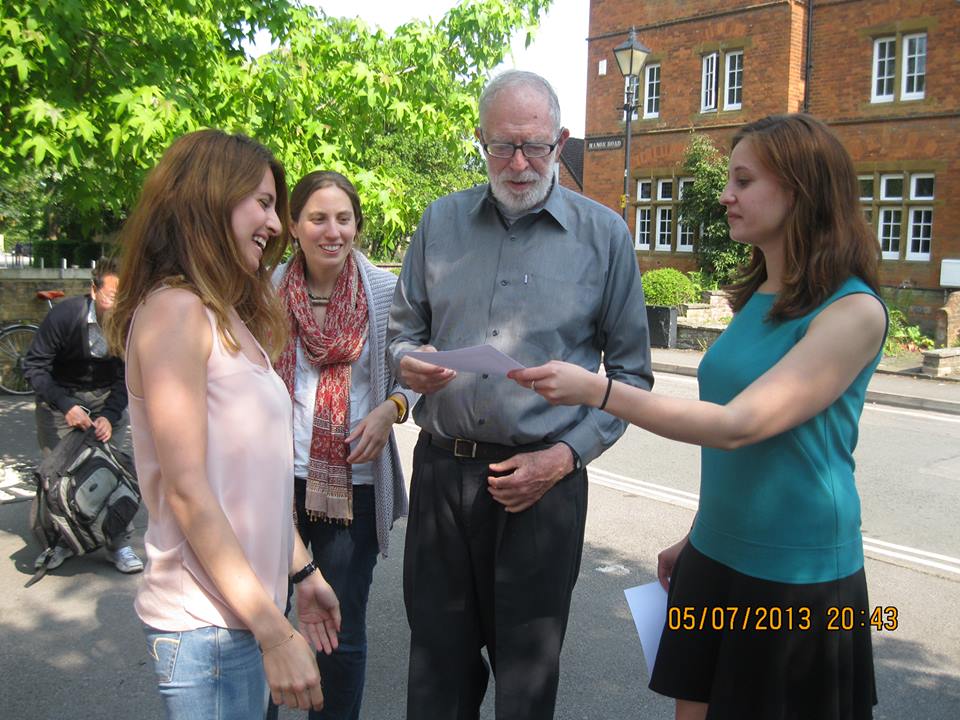 Billur Aslan (far left) receiving her Institute certificate from the legendary Monroe Price (second right).NPCU PhD student Billur Aslan attended the Annenberg-Oxford Media Policy Summer Institute between June 24th and July 5th at Oxford University. The Institute brought together young academicians, lawyers and regulators from all over the world. This year, the seminars focused on two main media policy topics. The first week’s seminars were concentrated on media transitions in conflict environments like Myanmar, South Africa and Arab Spring countries. In the second week, speakers discussed the Internet policies and regulations around the world. Participants were also informed about strategic communication in conflict, post-conflict and transitional environments. Billur delivered a presentation about the role of the Internet on political transition in Egypt. The paper was titled: The Diffusion of Revolutionary Movements via the Internet: Egyptian Protests.
Billur Aslan (far left) receiving her Institute certificate from the legendary Monroe Price (second right).NPCU PhD student Billur Aslan attended the Annenberg-Oxford Media Policy Summer Institute between June 24th and July 5th at Oxford University. The Institute brought together young academicians, lawyers and regulators from all over the world. This year, the seminars focused on two main media policy topics. The first week’s seminars were concentrated on media transitions in conflict environments like Myanmar, South Africa and Arab Spring countries. In the second week, speakers discussed the Internet policies and regulations around the world. Participants were also informed about strategic communication in conflict, post-conflict and transitional environments. Billur delivered a presentation about the role of the Internet on political transition in Egypt. The paper was titled: The Diffusion of Revolutionary Movements via the Internet: Egyptian Protests.
The key speakers at the institute were: Yaman Akdeniz, Collin Anderson, Gregory Asmolov, Joan Barata, Susan Benesch, David Campbell, Ge Chen, Rogier Creemers, Richard Danbury, James Deane, Iginio Gagliardone, Esben Q. Harboe, Jose Alberto de Azeredo Lopes, Robin Mansell, Tarlach McGonagle, Ben O'Loughlin, Oreste Pollicino, Monroe Price, Rob Procter, Nawfel Raghay, Krisztina Rozgonyi, Christian Sandvig , Daniela Stockmann, Nicole Stremlau, Chris Watson, George Weiss, Hu Yong, Sudharma Yoonaidharma.
Participants also spent a day at Ofcom, the UK’s media regulator. The Ofcom staff spoke to the group about traditional media regulations in the UK and new developments they are facing.



 Ms Tanja AITAMURTO, Finland, Visiting Researcher at the Program on Liberation Technology at Stanford University
Ms Tanja AITAMURTO, Finland, Visiting Researcher at the Program on Liberation Technology at Stanford University  Mr Paul GUYOT, France, Co-founder and CEO of Semiocast
Mr Paul GUYOT, France, Co-founder and CEO of Semiocast Mr Mikael JUNGNER, Finland, Member of Parliament
Mr Mikael JUNGNER, Finland, Member of Parliament Mr Joonas PEKKANEN, Finland, Founder of Open Ministry
Mr Joonas PEKKANEN, Finland, Founder of Open Ministry




